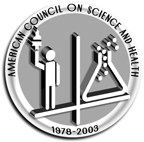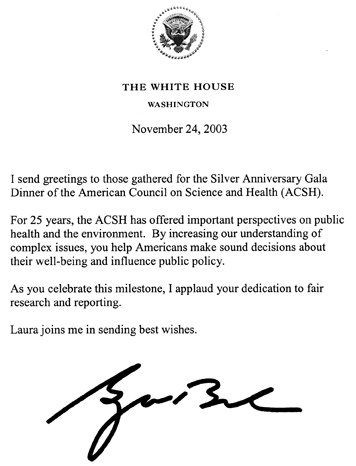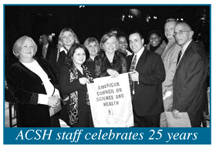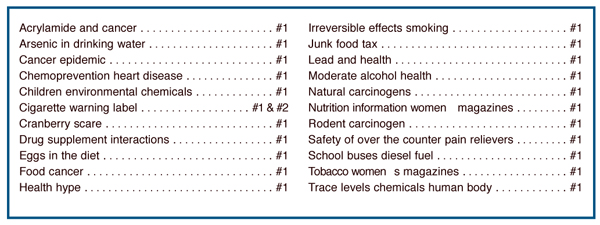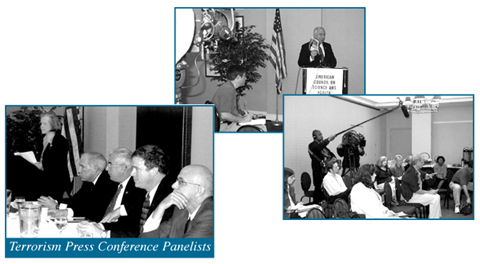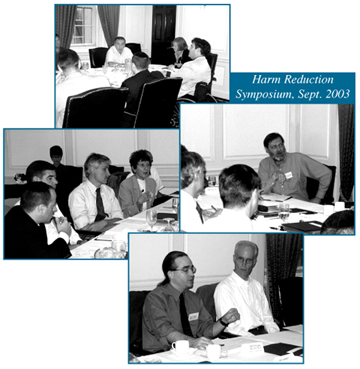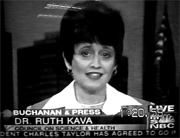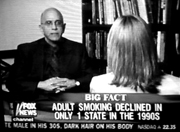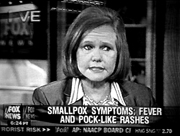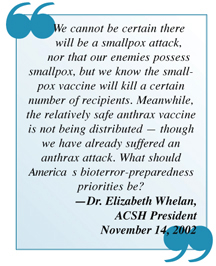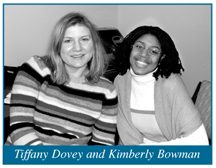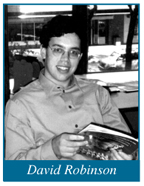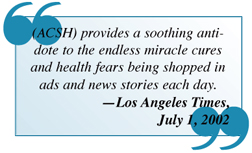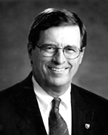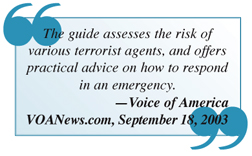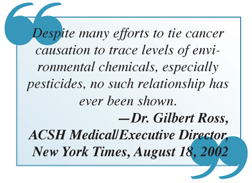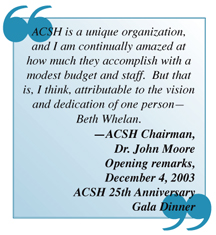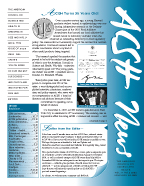

ACSH Turns 25 Years Old!
Over a quarter-century ago, a young Harvard graduate student trained in epidemiology was conducting independent research on the Delaney Clause (part of the 1958 Food Additive Amendment that banned any food additive that caused cancer in laboratory animals) when she observed an interesting dichotomy in food regulatory policy: the science did not necessarily support the worries that motivated regulators. Continued research led to similar conclusions about a myriad of other useful products being targeted.
That research sparked the question that proved to be both the catalyst and genesis of what is now the American Council on Science and Health. Why didn't scientists vehemently speak out? The young graduate student was ACSH's president and co-founder, Dr. Elizabeth Whelan. Twenty-five years later, ACSH has grown to comprise over 350 of the nation's most distinguished and accomplished scientists, physicians, academicians and policy experts, who serve without compensation on ACSH's board of directors and advisors because of their commitment to speaking out on behalf of science. On December 4, 2003, ACSH hosted a gala dinner in New York City to celebrate its 25th anniversary. The evening was an impressive affair honoring ACSH's science and success and the roster of distinguished guests and award recipients, read like a page from Who's Who in America. ACSH presented its award for distinguished achievement in medicine and public health to Mark B. McClellan, M.D., Ph.D., Commissioner of the U.S. Food and Drug Administration. Although severe weather conditions precluded Dr. McClellan's attendance that day, notably accepting the award and presenting the keynote remarks on his behalf was Commissioner McClellan's special deputy assistant, Dr. Scott Gottlieb. Other awardees included Wall Street Journal editor emeritus Robert Bartley (who, we are saddened to report, died on December 10, a week after receiving ACSH's honor); Nobel Laureate Dr. Norman Borlaug; former U.S. Surgeon General C. Everett Koop; Dr. D.A. Henderson, who orchestrated the eradication of smallpox from the world; and Dr. Bruce Ames, inventor of the infamous Ames test used to screen mutagens. ABC News' John Stossel served as Master of Ceremonies. On the same day, Stossel's commentary "The Anti-Junk Scientists," honoring ACSH's milestone, was published in the New York Post. Special guest speakers included Christopher Buckley, humorist and author of Thank You for Smoking and No Way to Treat a First Lady, and Barry Farber, host of The Barry Farber Show.
Surprisingly, ACSH learned earlier in the week that President Bush issued the Presidential Medal of Freedom to one of its award recipients Robert Bartley. However, not until after the event did ACSH realize that three other ACSH awardees Drs. Borlaug (1977), Koop (1995) and Henderson (2002) each had already been recipients of this award, the highest national honor given to a civilian. Most Americans will never be in the presence of even one Presidential Medal of Freedom recipient yet on that night ACSH was honored with the presence of four. The stellar group of individuals both associated with and assembled by ACSH on that evening some of the most erudite individuals this nation has to offer, whose contributions have changed the course of history crystallized Dr. Whelan's vision of more than 25 years ago. Perhaps the greatest affirmation of ACSH's success came in the form of a press release and letter sent to Commissioner McClellan by The Center for Science in the Public Interest's Michael Jacobson. The strongly worded letter warned the Commissioner that accepting the ACSH honor would "tarnish [his] reputation and credibility." Rather than calling ACSH's scientific positions into question by pointing to hard scientific evidence, Jacobson was forced instead to once again use innuendo in attacking the credibility of the country's creme de la creme scientists and health professionals. Amidst such an impressive gathering of minds one can only wonder about the clarity of Jacobson's own mind as he attempted to silence ACSH an organization that continues to challenge the likes of CSPI and their junk science pronouncements. We encourage you to visit www.acsh.org to view other photos, and to read remarks from this important and memorable occasion. ACSH's Public Impact: ACSH is frequently #1 on Google!
A recent survey of the extent of coverage ACSH receives in Google, the top-ranked Internet search engine, reveals that ACSH's scientific positions are readily accessed by Internet users and indeed in many cases, ACSH reports appear at the top of the Google search. A search on a very broad range of public health topics from smoking to drug-supplement interactions repeatedly points the searcher to the websites of the American Council on Science and Health, indicating that ACSH's message is being widely received. To read the full report, please log onto acsh.org. Selected sample of the search topics and ACSH's Google ranking as of October 23, 2003
ACSH Hosts Press Conference to Release Two New Books on Terrorism PreparednessAt a press conference in New York on September 17, 2003, ACSH was joined by a panel of experts to release A Citizen's Guide to Terrorism Preparedness and Response: Chemical, Biological, Radiological and Nuclear, and the companion New Yorker's Guide to Terrorism Preparedness and Response similar in content, but written specifically for residents of New York City. The 92-page guides address all aspects of terrorism preparedness from hard facts about weapons of mass destruction to the psychological effects of terrorism dispelling myths and citing facts on how citizens can be prepared for possible future terrorist attacks. Panelists joining ACSH president Dr. Elizabeth Whelan and executive and medical director Dr. Gilbert Ross to respond to media inquiries included: Dr. Ronald C. Crystal, Department of Genetic Medicine, Weill Medical College of Cornell University; Dr. P. Andrew Karam, Radiation Safety Officer, the University of Rochester; Dr. Henry I. Miller, Fellow, Hoover Institution; Dr. Marc K. Siegel, Assistant Professor of Medicine and Infectious Diseases, NYU Medical Center; and Randal L. West, a retired Major General who served as the senior advisor for the Deputy Secretary of Defense for Chemical and Biological Protection from July 1999 to February 2001.
Complimentary copies of the book were widely distributed both locally and nationally to the media, federal and state homeland security organizations, NYC government agencies and opinion leaders, and public health associations and institutions. Fox Evening News featured ACSH president Dr. Elizabeth Whelan in a segment on terrorism preparedness the same day. While the guides received a great deal of press coverage, a New York Daily News headline that appeared on the following day neatly summed it up in an article entitled "Disaster Guide: Don't Get Stuck with Duct Tape" the title itself highlighting the misinformation the guides were intended to quell. The ACSH terrorism guides were funded by generous grants received from the Achelis and Bodman Foundations, the Milbank Foundation for Rehabilitation, and the Dodge Jones Foundation. Children and Environmental ChemicalsEdited by toxicologist Dr. Daland Juberg with a foreword by former U.S. Surgeon General Dr. C. Everett Koop In January 2003, ACSH published its long-awaited book Are Children More Vulnerable to Environmental Chemicals? Protecting children from environmental chemicals has become the mantra of many advocates who believe that without strict regulatory action, our children are in danger. We are at a juncture where emotion, fear, and uncertainty compete with scientific data, toxicological principles, and proper risk analysis. This book evaluates the science behind the scares from several critical perspectives and reveals that there is no scientific evidence to support the claim that children are more vulnerable to all environmental chemicals. It also unveils a disturbing pattern in which activists with a non-science agenda manipulate the public's legitimate and appropriate concern for children's health in an effort to promote legislation, litigation, and regulation. Highlights of media coverage of the book in 2003 include the February 10 Washington Times article "Koop Backs Book Minimizing Danger of Toxins to Children," Steve Milloy's January 30 review of the book on the FoxNews website, Steve Milloy's January 17 FoxNews.com article "Greens to Launch New Scare Campaign," a February 27 op-ed in the San Marcos Daily Record, a February 16 editorial in the Chattanooga Times Free Press, a February 20 Copley News Service commentary by Doug Bandow titled "Chemical Hysteria and Environmental Politics," and Dr. Stephen Barrett's February 16 commentary in the Chattanooga Times "Phony Health Crises Manipulate Parents." The book was distributed nationally to various government branches, including the Centers for Disease Control. To order your own copy of Are Children More Vulnerable to Environmental Chemicals? please complete an order form that can be downloaded from www.acsh.org and fax it to 212-362-4919, or email orders@acsh.org. Discounts are available for bulk orders. Harm Reduction Symposium, Part II
On September 15, 2003, ACSH hosted a special symposium in New York to discuss smokeless tobacco as a harm reduction intervention for cigarette smokers. Unlike ACSH's previous educational harm reduction symposium in June 2002, which was open to the media and the public, the purpose of this forum was to initiate a scientific discussion between leading proponents and opponents of smokeless tobacco use as a harm reduction alternative. The goal was to establish a scientific discourse between the two groups and, perhaps, bridge some of the differences on this controversial public health alternative. While no position statement or consensus was formulated at this meeting, the forum was successful in getting each side to recognize the passion they share in decreasing the devastating toll of cigarette smoking on health. The task at hand is to determine how the two groups can reach an accord that will best serve the public interest. ACSH Receives Technology GrantACSH was recently awarded a generous technology grant by the E. L. Wiegand Foundation to upgrade its computer infrastructure and website technology. The redesigned ACSH websites will be more user-friendly and include new features such as a "My ACSH" personalized webpage option, an online shopping cart for easy ordering of ACSH publications, an "email to a friend" option for all ACSH articles, a new "blog" site forHealthFactsandFears.com with automatic posting and response, automated email alert bulletins selected by the subscribers' area of interest, a special "news center" covering current topics, and much, much more. Please watch for the launch of the newly designed websites in March 2004. ACSH Responds to America's War on FatIn 2001 the Surgeon General issued a call to action in response to a growing obesity problem in America. This urgent and earnest plea, however, has resulted in many misguided efforts to reduce America's growing waistline. Advocacy groups have pushed to ban popular food products and to impose fat taxes while trial lawyers have rushed to sue fast food companies for their high caloric food products. Missing from the obesity dialog are such commonsense solutions as educating the public about good diets, exercise, and how an excess of calories consumed relative to calories expended causes weight gain. As the media repeatedly calls upon ACSH to deliver science-based information, ACSH plays a prominent role in bringing rationality to the obesity controversy by targeting the underlying causes of obesity and advising the public to steer clear of simplistic gimmicks like fast food lawsuits, efforts to ban Oreo cookies, and fat taxes.
Media SpotlightIn addition to the aforementioned special events and releases, ACSH representatives continue to serve as media watchdogs speaking out on a host of other public and environmental health topics. Many of these articles, editorials and letters can be read in the December 2003 issue of Media Update or on ACSH's website. Food Safety and Nutrition
Smoking and Health
Chemicals and the Environment
Terrorism
Pharmaceutical Issues
Science and Technology
ACSH News Briefs ACSH on AcrylamideThe January 2003 press release "New Study Finds No Acrylamide-Cancer Link in Humans" alerted consumers to breaking research from the Harvard School of Public Health and Sweden's Karolinska Institute that was consistent with ACSH's own report, which found no link between consumption of acrylamide from foods and the occurrence of colon, bladder or kidney cancers. For more information about acrylamide, see the ACSH publication, Acrylamide in Food: Is It a Real Threat to Public Health? that is available online at www.acsh.org. National coverage of ACSH's press release and report included a January 20, 2003 Time magazine article, "Your A to Z Guide to the Year in Medicine." In July 2002 ACSH decided to use the acrylamide scare to make a statement about the absurdity of California's Proposition 65 by filing a letter of intent in California against Whole Foods Market, which bakes and sells "natural" breads that contain acrylamide but aren't labeled as containing such natural carcinogens. The Prop 65 law requires companies to affix warning labels to any of their products whether manufactured cancer-causing chemicals or natural ones that contain carcinogens. In a July 24, 2002 article, "Toxic Green," for FrontPageMagazine.com Lowell Ponte declared: "Among our teachers this week is Jeff Stier, an attorney for the American Council on Science and Health and a black belt master at political jujitsu. Stier has announced that he aims to file a lawsuit against a California organic foods company for violating state law." The lawsuit resulted in several news articles in 2002 including the July 10 Reuters article "Organic Bread Targeted to Show Absurd Health Scares," the July 25 San Francisco Examiner editorial "Whole Wheat Hooey," Steve Milloy's July 26 article "Organic Industry's Thin Skin" onFoxNews.com, the July 26 MSNBC.com article "Organic Bread Targeted," the July 29 HealthScoutNews article "Boiling Best Bet to Avoid Harmful Food By-Product," the July 31 New York Times article "How Big Is the Acrylamide Risk?," the August 4 commentary "The Boy Who Cried Rodent Carcinogen" by ACSH advisor Dr. Henry I. Miller that appeared in the Los Angeles Times, and the September 30 article "Special Sauce Indeed: A Proposition 65 Suit Says McDonald's and Burger King Are Serving Up Carcinogens Along With Those French Fries" that appeared in the San Francisco Daily Journal. ACSH on Anthrax
In October 2002, ACSH medical and executive director Dr. Gilbert Ross served on a panel convened by BioPort Corporation the sole licensed maker of an anthrax vaccine which found that the United States is ill-prepared to deal with another anthrax attack. Other panel members included two retired military officers with experience in the department of defense's chemical and biological protection and three other doctors. "Why, after a bioterrorist assault with anthrax spores, have preparations shifted from anthrax to smallpox?" asked Dr. Ross in a December 1, 2002 Clinical Infectious Disease story. Dr. Ross was also quoted in an October 17, 2002 United Press International article as saying "Over a year has gone by since the anthrax attacks...and we're still not prepared or even on the way to preparing for an anthrax attack." The panel's findings appeared in an October 18, 2002 Atlanta Journal-Constitution story, a December 4 article in Biotech Week, the October 17 Scripps Howard News Service story "Response Not Set for Anthrax Response," the October 18 Reuters article "Company, Group Call for Public Anthrax Vaccination" that appeared on ABCNews.com and a March 25, 2003 The Hill piece. In October 2003 ACSH published its own peer-reviewed report on the subject, ANTHRAX: What You Need to Know. ACSH Internships
During a summer high-school internship at ACSH, Brette Tannenbaum and Rebecca Welsh decided it was time that high school students had access to accurate, scientifically sound health information and advice as well. Thus, they spent the summer working on a publication titled The Student Body, which focused on nutrition and discussed the food pyramid, a vegetarian diet and nutrition myths. ACSH supported these ambitious students' endeavors by providing copies of ACSH nutrition reports and pamphlets, as well as reviewing their final draft before it went to press in November 2002. ACSH nutrition director Dr. Ruth Kava commented: "Brette and Rebecca produced an excellent, teen-oriented publication that hits the high points of rational nutritional advice. Having insiders' understanding of the issues important to their peers, they managed to convey sound, science-based nutritional and lifestyle advice without preaching or 'talking down' to their readers." Both girls are graduating seniors at Dalton School in New York City. Congratulations on a job well done! ACSH is pleased to welcome two new one-year interns. Kimberly Bowman is a graduate of Brown University with a BA in biomedical ethics. She plans to attend medical school in the fall of 2004. Tiffany Dovey received a BA degree with distinction in philosophy, public health and community medicine from the University of Washington in June 2002. ACSH Educational Outreach
ACSH Cancer Clusters Intern Receives Recognition
In December 2003 David Robinson a 2001 summer ACSH intern whose principal responsibility during his internship was to research and revise ACSH's Cancer Clusters report was selected as a 2004 Rhodes Scholars from among 963 applicants. ACSH was pleased to submit a letter of recommendation on his behalf. Congratulations, David! ACSH and the EPAIn April 2003 the Environmental Protection Agency released its Drafts of "Guidelines for Carcinogen Risk Assessment" and "Supplemental Guidance for Assessing Cancer Susceptibility from Early Life Exposure to Carcinogens." However, there was no evidence that the EPA consulted with the National Cancer Institute or other experts on the established risk factors for human cancer. Thus, on April 8, ACSH respectfully submitted to the EPA some "supplemental guidance" of its own, writing: "It is critical to note that human exposure to trace levels of environmental chemicals is NOT on the list of known risk factors for cancer. Thus, in attempting to identify and assess the degree of risk for adult or childhood exposure to trace levels of environmental chemicals, the EPA is focused not on an established but rather on a hypothetical risk of human cancer." ACSH Urges Irradiation of Ground MeatsThe summer of 2002 was marked by various news stories about meat contamination and ACSH found this an opportune time to further advocate the use of irradiation to help prevent consumer illness. ACSH's July 22, 2002 press release stated: "Irradiation of ground meat products (the meat most likely to cause problems when contaminated) kills bacteria without harming either the flavor or nutritive value of the meat. It does not make the food radioactive. Food irradiation has been studied for over forty years and has been shown to be an effective means of ensuring food safety." ACSH president Dr. Elizabeth Whelan further added: "Consumers should be demanding that irradiation be added to the arsenal of techniques routinely used to safeguard our food supply." In May 2003, ACSH released its fifth edition of Irradiated Foods, revised and updated with the most current information on the subject (see "New ACSH Publications"). ACSH and McDonald'sIn a February 2003 press release, ACSH called a second filing of a lawsuit against the McDonald's Corporation by lawyers representing two overweight teenagers "without scientific merit." The suit alleged that the plaintiffs ate McDonald's foods to the detriment of their weight and health. It decries McDonald's food as being "non-nutritious," in part because many of the products contain preservatives and other "chemicals." The lawsuit implies that natural, unprocessed foods are chemical-free and thus "healthier." In fact, ACSH scientists note, not only are chemicals such as preservatives not harmful, they help protect health by preventing spoilage, and the Food and Drug Administration (FDA) have approved them all. The lawsuit also claims that McDonald's literature misrepresented their foods as being "healthy." "Obesity is a serious health threat in the United States: the number of overweight and obese Americans has soared over the last few decades," emphasized Dr. Ruth Kava, ACSH nutrition director. "But suits such as this one are counterproductive. The suit is misleading in that it falsely implies that consuming processed foods with 'chemicals' can cause obesity...This is absurd. As already noted, all foods are composed of chemicals and it is an excess of calories consumed relative to calories expended that causes weight gain." ACSH's View on HRTA study in 2001 found that women taking a combination of estrogen and progestin (at a dosage equivalent to the Wyeth drug Prempro) for four or more years face a slightly increased risk of heart disease, breast cancer or stroke. These results ran contrary to popular and widely-held medical wisdom and left many women wondering what they should do. In a July 30, 2002, press release ACSH attempted to answer that question by suggesting: "In conjunction with her physician, a woman evaluating postmenopausal hormone therapy must define: a) what individual goals she is seeking to achieve and b) what her unique risks might be." HRT should not be completely discounted: "Estrogen and combination therapies are particularly efficacious in addressing uncomfortable even disabling symptoms of menopause, especially hot flashes, and including vaginal atrophy and dryness...For hot flashes, at this time there appears to be no other alternative to estrogen therapy, either alone or in combination... [there] is no reason to throw the baby out with the bath water: hormone therapy which includes estrogen still has an important, although now somewhat more limited, role to play in women's health." HealthFactsandFears.com Bulletin
The ACSH webzine HealthFactsandFears.com has been going strong with its stories being re-printed in other media outlets, as well as science-defending websites, such as TechCentralStation.com, Spiked-Online.com and Reason.com. Join the nearly 1,300 other subscribers who stay abreast of what's current on ACSH's online magazine,HealthFactsandFears.com, by signing up to receive regular email bulletins of all the new articles, editorials and commentaries posted on HFAF each week. To join, visit the HealthFactsandFears.com homepage and submit your email address directly, or send an email message to seavey[at]acsh.org. The body of the email should include the phrase "subscribe HealthFactsandFears.com bulletin." ACSH Appreciates Your DonationIn response to difficult economic times, ACSH sent out a special appeal for advisor/director donations on December 2002. ACSH gratefully acknowledges the generosity of the following individuals whose donations have helped to maintain ACSH's work in 2003: Dr. Arthur J. Siedler, Dr. Herbert P. Sarett, Dr. Jack Fisher, Jack Fisher/Plastic Surgery Research Foundation, Dr. Glenn Swogger, Jr., Dr. George M. Burditt, Dr. Terry Anderson, Dr. John B. Fenger, Dr. Richard Greenberg, ACSH president Dr. Elizabeth Whelan, and ACSH medical/ executive director Dr. Gilbert Ross. We thank you! ACSH UpdateOver 14,000 individuals are presently enrolled to receive ACSH Update a periodic email bulletin from ACSH that keeps subscribers informed as to its general programs, activities and publications. To join Update, visit the ACSH homepage, www.acsh.org, and sign up directly, or send an email message to stier[at]acsh.org. The body of the email message should include the phrase "subscribe update." ACSH Welcomes New Chair
In the spring of 2003, ACSH elected John H. Moore, Ph.D., M.B.A., as the new chair of ACSH's Board of Directors. Dr. Moore who is president emeritus of Grove City College and a current ACSH board member succeeds Dr. Fredric M. Steinberg in the position. ACSH wishes to gratefully acknowledge Dr. Steinberg for his many years of service. ACSH Scientific Advisory Board Grows in Size, Stature and InfluenceForty distinguished scientists, policy advisors and health professionals have accepted invitations from ACSH's Board of Directors to join ACSH's Board of Scientific Advisors. ACSH advisors help ensure the scientific integrity of the organization's position statements, press releases and publications by writing and researching ACSH articles, reviewing ACSH reports, and participating in ACSH seminars, press conferences, media communications and other educational activities. The already impressive ACSH Board will benefit greatly from the addition of its new members, with experience and expertise in bioterrorism, epidemiology, infectious diseases and biotechnology, areas most pertinent to today's public health. Here is a brief introduction to each of the new members ACSH recently welcomed (Note: Advisors marked with an asterisk will also serve on the board of ACSH's New York City Advisory Council on Health Priorities):
Update on ACSH Publications ACSH Papers in Professional JournalsACSH Advisor Dr. Clare Hasler published her position paper "Functional Foods: Benefits, Concerns and Challenges A Position Paper from the American Council on Science and Health" in the December 2002 issue of Journal of Nutrition. In November 2002, the online journal Medscape General Medicine published the ACSH report Cancer Clusters: Findings vs. Feelings, by David Robinson, which concludes, contrary to popular belief, there in no evidence supporting the link between industrial pollution in the environment and local "cancer clusters." And in November 2002, ACSH advisor Dr. Kenneth Brown and ACSH medical/executive director Dr. Gilbert Ross' paper "Arsenic, Drinking Water, and Health: A position paper of the American Council on Science and Health" was published in Regulatory Toxicology and Pharmacology. ACSH Books2003 saw the publication of four full-length ACSH books:
A Citizen's Guide to Terrorism Preparedness and Response: Chemical Biological, Radiological and Nuclear(September 2003/ISBN 0-9727094-1-X) New Yorker's Guide to Terrorism Preparedness and Response: Chemical Biological, Radiological and Nuclear (September 2003/ISBN 0-9727094-2-8) Cigarettes: What The Warning Label Doesn't Tell You Revised and Updated for the 21st Century (June 2003/ISBN 0-9727094-3-6) This widely acclaimed book first published by ACSH in 1996 documents the devastating effects of cigarette smoking by areas of medical specialty. It includes separate chapters on the impact of smoking in the areas of lung disease, oncology, heart disease, vascular disease, skin, surgical risks, orthopedic problems, rheumatologic condition, pediatric illness, neurology, psychiatry, otolaryngology, oral health, endocrine system, gastrointestinal disease, urology, emergency medicine, and obstetrics and gynecology. ACSH updates the book with new information that has emerged in the past seven years. You'll be surprised by how much more science has learned about cigarettes and health, as if it wasn't bad enough before. This update was funded by a generous grant from the F.M. Kirby Foundation. Are Children More Vulnerable to Environmental Chemicals? Scientific and Regulatory Issues in Perspective (January 2003/ISBN 0-9727094-0-1) New PublicationsAnthrax: What You Need to Know (October 2003) In the post-September 11 era of terrorism, the federal government has placed great emphasis on the potential threat posed by smallpox as a biological weapon. Anthrax, however, is in many respects an ideal bioweapon. This report looks at the threat of anthrax when used as a biological weapon and provides consumers with the answers that they need. Kicking Butts in the Twenty-First Century: What Modern Science Has Learned about Smoking Cessation (August 2003) Cigarette smoking remains the leading cause of premature disease and death in America. And million of Americans who indulge in this deadly habit seek ways of quitting. This ACSH guide provides information about all of the current options and products available to help smokers quit. Irradiated Foods (May 2003) Over 50 years of scientific research has established that the irradiation of foods to minimize food-borne illness and decrease waste is both safe and effective. Physicians and scientists associated with ACSH endorse the use of irradiation to enhance safety and supplement other food protection methods. These, along with other facts about food irradiation, are spelled out in the latest (fifth) edition of Irradiated Foods.
Traces of Environmental Chemicals in the Human Body: Are They a Risk to Health? (April 2003) In this newly updated report of its 1999 release, ACSH revisits the topic and maintains its previous position that the mere ability to measure small amounts of environmental chemicals in human blood and other tissue is not an indication of the presence of a health hazard. Nothing has been published in the past four years to counter ACSH's original conclusion. The Role of Beef in the American Diet (January 2003) Despite the positive news about beef, nutrition, and health, many Americans are misinformed and think that including beef in their diets will have negative health consequences. But, as the ACSH report explains, many of the supposed health risks associated with consuming beef lack strong scientific support or have been exaggerated. Acrylamide in Food: Is It a Real Threat to Public Health? (Online only; December 2002) Scientists associated with ACSH find no compelling evidence that acrylamide, when consumed in foods such as French fries and bread, poses a risk of human cancer. This review and analysis, written by Dr. Joseph D. Rosen of Rutgers University, is consistent with recent findings of the U.S. Food and Drug Administration (FDA), which reported that while acrylamide is present in various common foods, there is no credible evidence that acrylamide in food poses a human cancer risk. Resolutions for Good Health: Resolve to Be Healthy in 2003 (Online only; December 2002) For New Year's, ACSH offers consumers 12 New Year's resolutions to help them increase their chances of having a healthy and happy 2003. Visit acsh.org for a list of ACSH's 2004 resolutions. HOLIDAY DINNER MENU 2002 (October 2002) Once again ACSH has analyzed the natural foods that make up a traditional holiday dinner and found that they are loaded with "carcinogens" chemicals that in large doses cause cancer in laboratory animals. None of these chemicals are made by man or added to the foods. Indeed, all of these "carcinogens" occur naturally in foods. But ACSH scientists have good news: these natural carcinogens pose no hazard to human health. Alzheimer's Disease: A Status Report For 2002 (October 2002) Alzheimer's disease (AD) is the most common cause of dementia (general mental deterioration) in the United States today, and it occurs primarily, yet not exclusively, in the elderly population. Unfortunately, there is currently no established way to prevent or cure AD. However, this ACSH report points out that the current spate of research into new diagnostic methods and pharmaceutical treatment holds hope for the future. The Role of Eggs in the Diet: Update (August 2002) Eggs play a valuable role in helping consumers achieve a balanced, varied and nutritious diet. While some may shun eggs, fearing a cholesterol-raising effect or the possibility of salmonella contamination, a substantial body of scientific research shows that dietary cholesterol has only a small effect on blood cholesterol and that the consumption of eggs up to an intake of one egg per day has no detectable effect on heart disease risk in healthy people. Books- and Publications-in-ProgressNutrition Accuracy in Popular Magazines (Jan 2000--Dec 2002) This ninth survey of nutrition coverage by popular magazine will determine how well popular magazines rank in their nutrition reporting. Cigarettes: What The Warning Label Doesn't Tell You--A Guide for Young Adults Most people who smoke develop this deadly habit during their teenage years. This new ACSH book will adapt ACSH's widely acclaimed and recently revised adult book on the subject (see page 16) for a teenage audience. PCBs: Is the Cure Worth the Costs? Update 2003 The public is besieged with advocacy-group and EPA-generated fears of "deadly contamination" of our fish and soil with PCBs, a long-banned but persistent chemical once used in various industrial activities. How dangerous to human health are current levels of PCB exposure? Should we be avoiding farmed salmon and other fish from eastern waters? All these topics and more will be discussed and clarified in the soon-to-be-published update of our 1997 paper on the health effects of PCBs. Osteoarthritis and Its Treatment: What You Need to Know Osteoarthritis is the most common form of arthritis, and a leading cause of work-related disability. It is a major drain of health care expenditures, and one of the more serious causes of suffering among senior citizens. Newer surgical remedies have helped restore function and relieve pain, but surgery is not the answer for everyone. The newer anti-arthritis drugs are effective in reducing pain in many arthritics, but are they as safe as claimed? ACSH's soon-to-be-published review of newer arthritis therapies will discuss this in depth. Bisphenol A (BPA) and Baby Bottles BPA is a substance found in various plastic products, including baby bottles. Some activist groups have called for the restriction or even banning of BPA, alleging that it is a risk to human health at the exposures we encounter in common consumer products. ACSH has undertaken an academic review to evaluate the validity of the claims about the chemical. Is Our Nation's War on Carcinogens Misguided? This ACSH expose will explore the economic impact of our nation's current public health efforts to purge our environment of hypothetical cancer-causing agents. It will document how the current trend of regulating and/or banning useful, safe products of technology threatens our economic well-being and our high standard of living by increasing consumer costs for essential resources and needlessly contributing to the burden of metastasizing government bureaucracy and increased federal taxation. Aging and Sexuality A science-based discussion of the issues surrounding sexuality in the aging population is now more important than ever, as the media spotlight has recently focused on drugs such as Viagra and other products aimed at sexual dysfunction. What was once a taboo subject is now considered a part of maintaining a healthy lifestyle. Tobacco and Women's Magazines, 2000-2003 Women of all ages devote a significant amount of their time to reading women's magazines and many get a substantial amount of their medical advice from these magazines, as opposed to their doctor or other healthcare professionals. Thus, these magazines serve as health education and health awareness materials. ACSH will compare and contrast data to document current trends. Previous ACSH surveys have shown improvement in the coverage of smoking-related information and a decrease in cigarette advertisements in recent years. Osteoporosis: New Approaches to Treatment, 2004 Osteoporosis is a condition characterized by substantial bone loss. When the extent of bone loss reaches a critical point fractures may occur as a result of very minor stress. This report will review treatment options that have evolved since ACSH last published on this topic in 1986. Combating Obesity in the United States Rates of obesity in America are on the rise and have been for some time. And the health implications of this trend are ominous. Obviously, the balance between energy intake and energy output has been changing for Americans over the past couple of decades. ACSH will produce a document on the balancing act that we all must manage in order to maintain a healthy weight and avoid the diseases associated with overweight. Are "Consumer Advocacy Groups" Really Acting in the Public Interest? A Guide for the Media Many so-called "consumer advocacy groups" like the Center for Science in the Public Interest (CSPI), Environmental Working Group (EWG), and the Natural Resources Defense Council (NRDC) purport to bring to the attention of the public important, science-based information about health and environmental issues. But do they? ACSH will unmask groups that receive funding and media attention that are not commensurate with their benefits to public health. Other topics, funding permitting:
|
|||||||||||||||||||||||||||||||||||||||||||||
| Related Links | |||||||||||||||||||||||||||||||||||||||||||||
|
|||||||||||||||||||||||||||||||||||||||||||||
